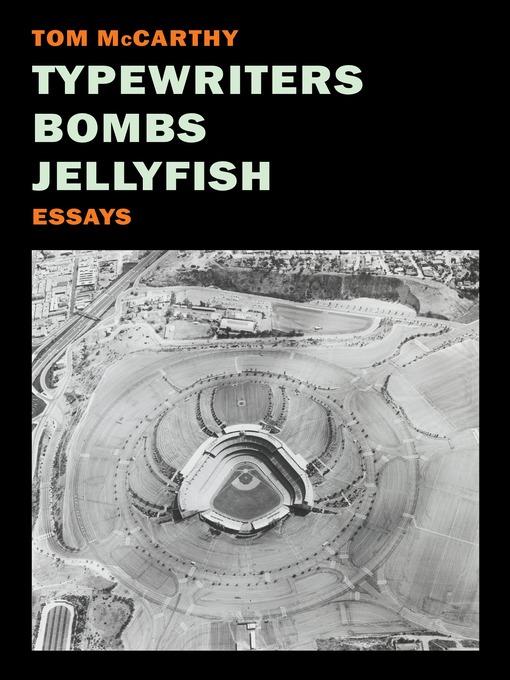
Typewriters, Bombs, Jellyfish
Essays
کتاب های مرتبط
- اطلاعات
- نقد و بررسی
- دیدگاه کاربران
نقد و بررسی

Starred review from March 13, 2017
Reviewed by Gabe Habash
The final sentence of McCarthy’s first essay collection is, “It might just be that the final measure of a writer is not so much what they achieve themselves as what they render possible for others.” It’s a wonderful idea, and reading Typewriters, Bombs, Jellyfish is like receiving a map of all the space that art, literature, and culture have carved out for each other.
Throughout the collection, McCarthy challenges readers to scrutinize his subject matter from unusual points of view. For example, he asks whether realism is really the most “authentic” depiction of reality. “The twentieth-century avant-garde often paints a far more realistic picture of experience than nineteenth-century realists ever did,” he says. This quote is from the essay titled “Get Real, or What Jellyfish Have to Tell Us About Literature,” which, like most of the collection, dizzyingly hopscotches from reference to reference: it begins with J.G. Ballard’s Crash and continues to Ford Maddox Ford, Gustave Flaubert, Roland Barthes, Vladimir Nabokov, and Sigmund Freud (among others) before ending on Alexander Trocchi. This is the kind of book that deepens your appreciation of the subjects you’ve previously encountered, and sends you to seek out the ones you haven’t.
A few of McCarthy’s preoccupations become apparent. Readers won’t be surprised to discover that McCarthy, whose own novels are fundamentally referential (see Remainder’s endless reenactment loop, or the “corporate anthropologist” of Satin Island considering how to cram the whole world into his “Great Report”), has a whole essay dedicated to Kathy Acker, the experimental writer who would “rework” famous literature in her books. Acker’s “systematic assault on originality,” he argues, is paradoxically more original than middlebrow fiction, which “endlessly recycl tired humanist clichés under the guise of originality.”
McCarthy has a propensity to fixate on what’s just outside of the focus, or, to put it another way, deconstructing what the focus is made of. In the essay “Why Ulysses Matters,” the focus is on matter itself, the base materials, waste, and sheer stuff that comprises Joyce’s novel: “It’s hard to think, outside of zombie movies, of a work more omnivoric.... Rats eat corpses; savages eat missionaries; Bloom eats cheese; cheese eats itself.” In another essay, “Nothing Will Have Taken Place Except the Place,” the focus is on what’s missing from Ed Ruscha’s photographs of empty parking lots: “What animates space is the trace of what has been excluded from it.” In yet another essay, “Blurring the Sublime,” the focus is the artist Gerhard Richter’s trademark “blur,” which, in fact, corrupts visual focus: “I blur to make everything equal, everything equally important and equally unimportant,” Richter says.
Typewriters, Bombs, Jellyfish is bursting with ideas; it is relentlessly curious, zeroing in on topics including David Lynch, soccer virtuoso Zinedine Zidane, “the time of fiction,” On Kawara, and the “displacement” that occurs when language meets weather. It encourages you to examine contradictions and to consider that art and life and literature are all part of a sticky web that retains traces of everything. Most of all, it encourages you to look more closely. As Zidane says: “Magic is sometimes very close to nothing at all. Nothing at all.”
Gabe Habash is PW’s deputy reviews editor and the author of the novel Stephen Florida (Coffee House, June).

Starred review from April 1, 2017
A debut collection of essays covering the scope of modern literature, along with a quiet plea for its violent overthrow.When it comes to realism, McCarthy, the author of such experimental novels as Remainder (2007), C. (2011), and Satin Island (2015), doesn't seek authenticity; he wants an explosion. The kind of real he has in mind involves "a radical and disastrous eruption within the always-and-irremediably inauthentic; a traumatic real; a real that's linked to repetition; a real whose framework of comprehension is ultimately neither literary nor philosophical but psychoanalytic." These essays are all invigorating examinations of writers (and artists such as Gerhard Richter, On Kawara, Ed Ruscha) who destroyed boundaries, collapsed rules of time, space, and gender, and bombed their own systems of control. On Joyce's radical use of language in Ulysses, for example, McCarthy remarks, "this is not interior monologue; it's exterior consciousness, embodied--or encorpsed--consciousness that has ruptured conventional syntax's membrane, prolapsed." More than 150 years earlier there was Laurence Sterne, who wrote a masterpiece in which conventional narrative order falls apart. "Error is everywhere in Tristram Shandy; it's the most glitch-ridden book imaginable--it's all glitch," McCarthy writes. "Everything gets lost or misdirected; every action generates unwanted consequences." A most illuminating essay on Kafka interprets the great writer's "Letter to His Father" in cybernetic terms, as a counterproductive "feedback loop," in which the relationship becomes not self-repairing but self-destructive. Through it all, McCarthy seems to be mapping out the coordinates of his own ambitions, wondering if there's any unchartered territory left. The thought is there in the book's final sentence, in a concluding essay on the life and work of the late Kathy Acker: "It might just be that the final measure of a writer is not so much what they achieve themselves as what they render possible for others." Stimulating, intellectually exciting, and highly imaginative.
COPYRIGHT(2017) Kirkus Reviews, ALL RIGHTS RESERVED.

























دیدگاه کاربران